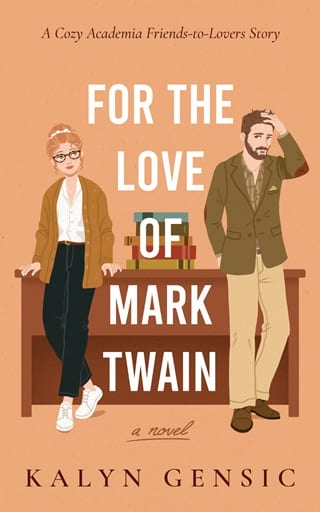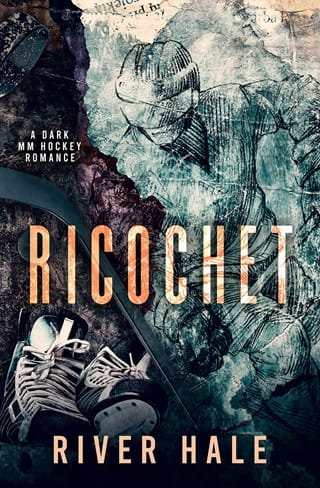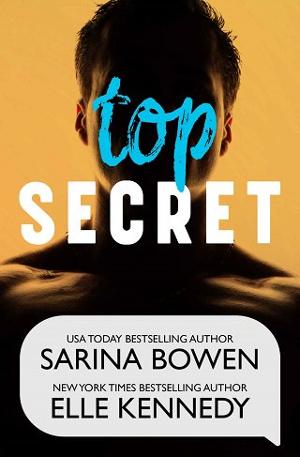2. Chapter 1
Chapter 1
Fall, 2017
T he weeks following the fall midterms were always filled with chaos in the PSU English Department as students ran in and out debating their grades and begging for an opportunity at redemption before finals. Lucy had managed to escape for a brief respite, but she did not dare stay away too long or she would never catch up.
Looking in the mirror of the ladies' bathroom, Lucy inhaled deeply, held it for a moment, and slowly exhaled. It was half-way through the afternoon, and she could not remember if she had yet been to the bathroom that day. She vaguely remembered doing so, but hadn't it been the day before?
Since graduating, Lucy had worked tirelessly as the office administrator for the English Department. There were three different offices for the department, each of which housed four professors. Lucy worked in the office that housed the department chair, Dr. Edith Rose, so their office was the central hub of the larger department.
When May of her senior year of college had come around, Lucy hadn’t felt certain about much. However, she’d known she wasn’t ready to fly the coop. College was still the first and only place she had ever been able to engage in erudite conversation without being thought unladylike, where feminism was an assumed value, and where her lack of feminine wiles and charm had not been counted as a strike against her.
So when the office administrator position opened up just as Lucy was preparing to walk across the stage, she quickly sent in an application thinking it would be a convenient stop-gap on her way to…something else. With her reputation among the department's professors as a student with an uncommonly strong work ethic, Lucy found the job was hers within the month.
There were numerous times over the years when Lucy had almost leapt to something new. She’d researched teacher certification and signed up for a few courses only to decide the timing wasn’t quite right. Every couple of years, she would get the itch for further education, leading to a small stack of graduate school applications in the bottom drawer of her desk.
Every time she took a step to move on from her “temporary” stint as a secretary, something would give her pause. Porter would announce another baby was on the way in his growing family. Dr. Hubert would have another health scare. Forrest would ask her to stay late to discuss a new research idea. Edith would ask her opinion on a matter of campus politics. Somehow, she never pushed send on the email. She never clicked the “Submit” button. She never dropped the envelope into the mail.
To be fair, Lucy had not spent the past ten years nursing the crush that had flickered into being that first day of her senior year. In fact, Dr. Forrest Graham and his dimples had not in any way figured into her accepting the position. Well, at most, he and his dimples had only been ten percent of the reason. Hardly a deciding factor. What mattered was that today and for many years preceding, she and Dr. Graham had become colleagues with a great deal of respect for one another.
Still hiding out in the bathroom, Lucy repositioned a bobby pin only to watch it pop out, not up to the task at hand. Lucy's strawberry blond hair was naturally wavy. Unfortunately, it was not a swimsuit-issue, beach-hair kind of wavy. It was, rather, an unruly mix of waves and curls that never seemed to stay where Lucy put them…hair products be damned.
Most days, Lucy twisted it up on the top of her head in a bun looped with a scrunchie, grateful that the contraption had recently made its way back in style so she could purchase it at the drugstore without looking hopelessly bleak.
Despite waking up a teensy bit late this morning (How many times had she hit the snooze? Three? Four?), Lucy had been able to rush through her normal, minimalist makeup routine; nude lip gloss on her full, coral lips, a light brushing of blush over her freckled cheek bones, and mascara to bring attention to olive-green eyes. Lucy's mother had once said, "Darlin', a little foundation would go a long way to covering up those freckles." These many years later, Lucy had yet to add it to her shopping list.
Growing up, Lucy's mother had dressed her in the ruffles, bows, and bright floral prints of Southern Belles, fashion statements that had always complemented her mother's own petite frame. It wasn't until Lucy was in her late teens and fully grown into her father's height that her mother admitted Lucy would never be petite or a Belle. The boutique pieces that were her mother’s second skin were patently unflattering on her daughter. Since then, Lucy dressed, or rather hid, in a closet of neutral colors. In general, it was a relief to escape the gingham sundresses and four-inch wedges of her youth, and Lucy appreciated the basic uniform.
Lucy buttoned and then unbuttoned the top of her navy-blue cardigan, debating if the hint of cleavage showing above her camisole should be hidden behind the sweater. With a short sigh and her lips pursed to one side, she buttoned it again.
Lucy was tall enough to be a bit too tall for the average guy. The skinny cut on her black dress pants likely drew attention to her height, but Lucy always wore black or nude flats to keep from being what her mother had called "offensively tall."
The one bold statement Lucy allowed in her appearance was her glasses. She wore a larger frame in a tortoise shell with just a hint of a cat-eye at the corners. They were Kate Spade and fabulous by any measure. While Lucy balked at perfectly curled and hair-sprayed hair, a thick mask of makeup, or fashion-forward clothing, she did appreciate a fine specimen of eyewear.
Peering into the mirror one more time, Lucy noticed a smudge on the bottom corner of her glasses. She took them off and did a quick cleaning using the hem of her cardigan. Putting them back on, Lucy swiped a few stray curls behind her ears in a futile attempt to tame the hair that had escaped her bun. The curls bounced right back.
Lucy took another deep breath, but this one did nothing to calm her. It was more a growl of frustration. Her hair was going to escape the bun, and the sweater looked ridiculous strained across her chest. She unbuttoned it again, and shook a little more hair loose, because what was the point? Conceding defeat, Lucy left the bathroom to return to the storm.
***
Forrest dismissed his class after what had been a very satisfactory lecture. Several students stayed behind to talk with him, and Forrest never rushed these after-class conversations. While Forrest loved the research part of his job, he found the teaching to be equally important and rewarding. On this particular afternoon, though, it was unusually difficult to not rush the students out. Forrest was distracted and eager to complete a task that had been hanging over his head.
Today, though, five students came up with questions regarding the midterms he had just returned. Four of the five were female. His colleague always kidded him about the number of female students who stayed after his classes, and Forrest cringed at the jesting. Now that Porter was a father of three, he was no longer the butt of these jokes, passing the baton to his unwilling younger colleague. Forrest was not blind to the truth: more than a few students had developed a crush on him during his first decade of teaching.
Fortunately, Forrest had become an expert at answering academic questions while deflecting all other forms of interest. Today, he was motivated to perform this exercise with even more efficiency than usual.
Ten minutes later, the last students left the class. Much to his mortification, the last one had both blushed and giggled on her way out. Finally free, Forrest focused on the task at hand.
Three o'clock on a Tuesday afternoon was perhaps a nontraditional time for a breakup, but it was a task he was ready to be done with. Four nights of sleep were enough to lose over a relationship that had run its course. Forrest left Hart Building and headed towards Rayburn Building, home of the science department.
For six months, Forrest had been in a relationship with Dr. Meredith Wray, a professor of biology. They had developed a routine that was predictable, a word Forrest usually liked. Every Wednesday night, she made pasta, and they had dinner (and a bit more) at her place. Every Friday, they went out for dinner and returned to his place.
And that was it.
Two evenings a week, they trudged through a few hours of conversation that had become painfully stale (they ran out of topics of mutual interest the first month). They then efficiently and with little passion fulfilled their mutual physical needs and went their separate ways until the next time. They were each content to ignore the other and focus entirely on their students and research projects and journal articles the other five days of the week.
It was not until this past Friday evening that Forrest had found their arrangement unsatisfactory. They were post-coital, laying on opposite sides of the bed. Cuddling was certainly not part of the deal. Dr. Wray began talking about her newest research project on the symbiotic relationship of insects and fungi. Being two college professors, it was not unusual for their pillow talk to turn to their most recent research or class materials. Romantic? No, but...
However, this time, something strange occurred. As Dr. Wray was enumerating the many ways in which insects benefit from the various properties of fungi, Forrest suddenly felt an overwhelming drowning feeling whoosh through his gut. He was so bored. So painfully bored. He did not want to be bored twice a week for another week. Or month. Or six months.
And more than the boredom, he felt guilt. Dr. Wray (goodness, shouldn't his mind use a first name when thinking of someone with whom he had been sleeping for six months?) was a nice person. A grand conversationalist? Perhaps not, at least not with him. But not a Friday or Wednesday had gone by that she had not shown kindness to him. She deserved someone who was not drowning in boredom two minutes into a discussion on plants and fungi. Odds were, she did not find the relationship between Walt Whitman's poetry and the Civil War all that engaging, either.
Halfway across campus to the science building, Forrest wondered if saying "the symbiosis of our arrangement has run its course" would be considerate of her interests or insulting to the extreme. Regardless, it was true.
If Forrest took a moment to be completely honest with himself, his and Dr. Wray's relationship was a reflection of all his romantic entanglements throughout his adult life. Forrest had never felt romantic love. At least, he had never felt the overwhelming passion that makes a man lose control. He had felt far more emotion reading about love than he had ever felt with a real, flesh-and-blood woman.
Fortunately, or unfortunately (Forrest could not decide which), he seemed to have a sixth sense for finding women who were unlikely to spark any great passion. For that matter, he had a knack for finding women who were unlikely to feel any great passion, either.
An objective observer would likely diagnose Forrest with run-of-the-mill momma issues, but the situation was much more nuanced than that. When Forrest was the age a person first develops memories, his mother walked out and never returned. She was a drug addict and died a few years after her departure.
Given that she had so easily left behind two children, Forrest doubted he had missed out on much by her absence. His sister, Gracie, had been more than willing to step in and nurture the brother who was only two years her junior. While Forrest suspected he was irreparably broken in the romance department, it was not because of a lack of motherly love during his childhood: Gracie had made sure he never wanted for affection or encouragement or care. Even now, at the age of 37, Forrest could always rely on Gracie's regular calls, visits, and invitations to her own home.
However, losing his mother had not been without cost. When Forrest’s mother walked out, she had taken a bit of his dad with her, and Forrest had always suspected it was the bit that could have given his dad the necessary willpower to walk away from the bottle. Granted, his father's alcoholism had started well before he had lost the love of his life. But the hope of a cure seemed completely lost when she left. So Forrest had spent his childhood staring into the shell of a man left behind by a once-passionate love gone wrong.
Forrest arrived at the Science Department and headed up to Dr. Wray's office. The knot he had carried in his stomach since the previous Friday evening tightened its grip. Although he had cycled through this relationship process a few times by his age, Forrest hated breaking up with women. He hated being a disappointment. He hated seeing his own failure to be what another person wanted or needed.
But right as he approached the door with Dr. Wray's name on a plaque, Forrest thought of how mind-numbingly boring the next evening would be if he did not complete this unsavory task. He lifted a fist to knock, the sound jarringly loud in the abandoned hallway. He opened the door as she said, "Come in."
"Good afternoon, Mer..." Why couldn't he say this woman's first name? "...you. How's that research going? You really sounded on the cusp of a breakthrough on Friday." Had she though? He couldn't remember a word she’d actually spoken other than symbiotic , insects , and fungi . The whole evening was a blur, so he was impressed he remembered that much.
"Hello, Forrest." She looked distracted, shuffling through stacks of paper that seemed to be sitting on top of, well, stacks of paper. Her hair, always kept short for efficiency's sake, was meticulously styled, and she was wearing a lab coat, likely on her way to examine bugs. Or fungi. The coat swallowed her severely thin body. "It's unusual to see you on a Tuesday. How can I help you?"
"Uh, well, I never know how to start these things, but I, uh, just wanted to, uh..." He sounded like an idiot. Forrest did not like sounding like an idiot. When one is a professor, it really isn't on brand to sound like an idiot.
"Forrest? What's wrong?" She didn't sound worried. More impatient than anything else.
"It's just, well, I think we should break up." There it was. He got it out. He sounded like an acne-clad adolescent stuttering to his first girlfriend, but the words were no longer knotted in his stomach.
Dr. Wray finally stopped shuffling papers and looked up at Forrest. He did not see hurt in her eyes, for which he was thankful. What he saw instead was a dawning awareness. "Oh, well. I suppose you're right."
"Huh?"
"I agree. I believe the symbiotic benefits of our relationship, while very satisfactory during the past six months, have likely reached their limits."
He’d clearly missed an opportunity there. Who knew?
"I'm so glad we're on the same page," Forrest said, and he was. He had managed to escape a long, dull Wednesday night, and hurt feelings had been avoided. Apparently, when he had pegged Dr. Wray as someone who was unlikely to become overly-attached, he had judged correctly. Something about this thought depressed him, but he shrugged off the requisite questions it posed.
"I guess I'll head out now, let you get back to whatever it is you are doing with those stacks of paper. I'll see you around campus?"
"Of course. I'll send you a copy of Scientific Monthly when I get the insect and fungi research completed."
At that, Forrest smiled. She really was nice. She just wasn't the right person for him, or him for her.
"I would love to read it. Have a great day."
Forrest left Rayburn and directed his steps towards Hart Building. He felt lighter knowing he had finished the dreaded job of ending a relationship. Forrest wondered if "relationship" was even the right word for what he and Dr. Wray had been doing the past six months. Had he ever been in an actual romantic relationship in his life?
Forrest dismissed these uncomfortable wonderings and focused his mind towards the direction he was moving. In a few minutes he would be back at the office, and he could deliver the next section of his work in progress into Lucy’s capable hands. She did all of Forrest's editing, and there was no one better at giving feedback or fleshing out half-formed ideas. Forrest was eager to sit across his desk from Lucy and think of nothing else except Walt Whitman, the Civil War, and poetry.
 Fullepub
Fullepub 



